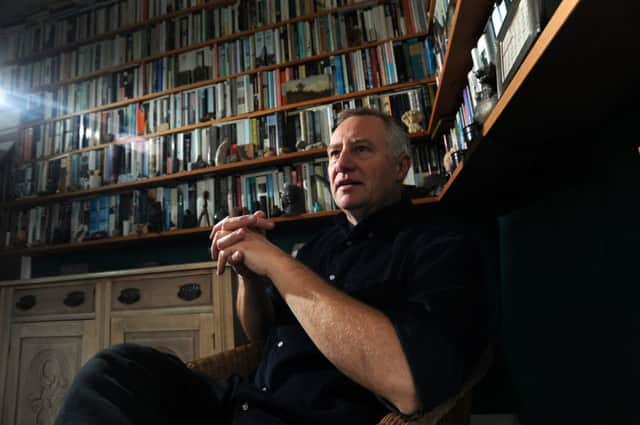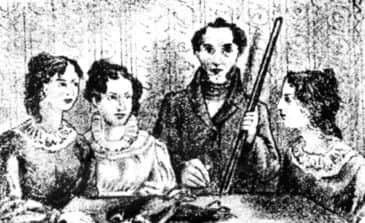In the shadow of the Brontës


There can be few literary figures more deserving of sympathy than Branwell Brontë. The only brother amongst a group of talented sisters, his final years were blighted by disillusionment, drugs and alcohol and he died at just 31 having never really achieved the potential he had shown as a youth.
It is this tragic aspect of his existence that is the focus of a new novel by award-winning author Robert Edric, which depicts the last few months of Branwell’s short life. Written entirely from the perspective of its protagonist, Sanctuary allows the reader to – literally – get inside Branwell’s head.
Advertisement
Hide AdAdvertisement
Hide AdEdric, who is based in Hornsea on the Yorkshire coast, says he was attracted by the conflict in Branwell’s character and situation and wanted to get under his skin. “I call it one of my ventriloquism novels – you have to inhabit the mind of this man. I have always been interested in people who live in unsettled times for reasons beyond their control. I’m also interested in people about whom we all assume we know something – Branwell was one of those characters. And it was good to have him as the narrator because he had intelligence and can express himself well. The novel is essentially a series of encounters – with his sisters, his father and his friends, all men who were unhappy with their lives and had taken to drink.”


While Charlotte, Emily and Anne have received a lot of attention from biographers, scholars and novelists, Branwell has, by comparison, been somewhat neglected. “A great metaphor for his life, I feel, is the famous portrait that he painted of the four of them and then erased himself from it,” says Edric. “Surely the most interesting thing about that portrait now is the missing figure. I think his sisters would not have been who they were without him. He was such a giant part of their childhood. Would they have become the writers they did if they hadn’t had him as a guiding force? The writing he left behind doesn’t suggest any great talent at that later age but the stories he wrote when he was younger were really interesting. It was a bit like he was the kindling and they became the flames.”
The novel opens a year after Branwell has returned to Haworth to live at the parsonage with his father and sisters following a particularly difficult period in his life. All his endeavours to find a suitable career seemed to come to nothing – a failed poet and portrait artist, he was sacked from the railways over a minor accounting error and dismissed from a tutoring position in disgrace after falling in love with his wealthy employer’s wife. This unhappy affair – with the much older married Lydia Robinson – hit Branwell particularly hard. “That is the one big event that tipped him into the final stages of his life,” says Edric. “He genuinely believed that she would set up home with him after her husband died and was horrified when it didn’t work out. He spent months waiting to hear from her and then began to realise that something wasn’t quite right. I think she might have been in love with him for a while but the terms of her husband’s will meant that she couldn’t be with Branwell. It was like one big hammer blow to him.”
Edric creates in his novel a believably claustrophobic atmosphere of inexorable decline as Branwell numbs his despair by running up tabs at a succession of local hostelries, sinking deeper into debt and depression, with little solace – it has to be said – from his sisters. Although he seems, at times, close to Emily – there is a lovely scene in which they sit silently together on the moor “listening to the wind and the birds and the movement of the grass” – and Anne is, on the whole, gentle and caring towards everyone, Branwell notes at one point that “the attention I received from my sisters remained a cold and changing wind”.
Advertisement
Hide AdAdvertisement
Hide AdThe family dynamics that Edric portrays are fascinating – Charlotte, in particular, seems very unsympathetic and judgmental even, towards her younger brother. “Charlotte had experienced her own unhappy love affair in Brussels with Monsieur Heger, a married man, and she came back to Haworth and decided to keep quiet and swallow all her anguish and grief,” says Edric. “Meanwhile Branwell came back and shouted about his grief, spending money he didn’t have and, through his behaviour, damaging friendships the family depended on. I think she found that difficult.”
The depiction of Branwell’s relationship with his father, Patrick, on the other hand, is very moving and suggests a tenderness, depth and complexity that Edric explores with great sensitivity. “It was an incredibly complicated relationship,” he says. “I think Patrick did feel a bit guilty that he hadn’t provided Branwell with a proper education, but he loved him and believed in him until the bitter end – we can see that in his letters. He must have had regrets, but I think he probably understood Branwell better than his sisters did.”
Edric says that the experience of writing the novel changed his feelings towards Branwell. “I felt a great deal for him – he was a terrible victim of circumstance and everything he tried to do for himself he failed at. His entire life was a succession of what ifs and if onlys. I didn’t actually go to Haworth until I had finished writing the book, but when I did I went into the Black Bull pub and had some spiced rum in Branwell’s honour.”
• Sanctuary by Robert Edric, published by Doubleday, £17.99.